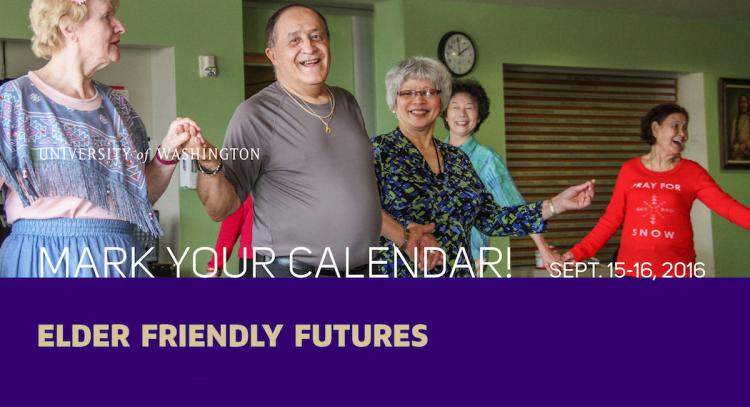Each year, the UW Elder Friendly Futures Conference brings together hundreds of stake holders in healthy aging, including researchers, clinicians, community organizers, students, housing professionals, and the general public, to discuss and learn about the science of brain aging and wellness and how to support an elder-friendly future.
The UW Memory and Brain Wellness Center (MBWC) team is excited to be on the steering committee for the upcoming 5th annual conference on September 15 - 16. Alongside a diverse array of contributors, we'll showcase our expertise in research, evidence-based wellness strategies, and dementia-friendly community transformation. Here's a glimpse:
- On the panel State of the Science: Alzheimer’s Disease and Related Dementias, Dr. Thomas Grabowski, Professor of Neurology at UW Medicine, will give a research update on the prevention and treatment of Alzheimer disease and related dementias. As the Director of the MBWC and the UW Alzheimer’s Disease Research Center (ADRC), Grabowski has insights to share on topics ranging from the promises of brain imaging to improve diagnosis, participation in research studies or clinical trials, and the best ways to live well with memory loss.
- Marigrace Becker, Program Manager of Community Education and Impact at MBWC, has been part of the Elder Friendly Futures conference since its second year. She will moderate the panel Mild Cognitive Impairment (MCI) and Early Dementia: Strategies for Health and Empowerment, which includes Deborah O’Connor, Co-Director of the Centre for Research on Personhood in Dementia at the University of British Columbia. She hails from an interdisciplinary research center focused on understanding people with dementia with the intentional recognition that the dementia experience is both a biomedical and a social condition. Her presentation will highlight the way that reducing societal stigma is a critical element of building dementia-friendly communities—a foundational principle of MBWC's program Our Time Has Come.
- Another featured speaker on this health and empowerment panel is Dr. Vaishali Phatak, neuropsychologist and Assistant Professor of Neurology at UW Medicine, who leads the HABIT Study at the UW. She will discuss behavioral interventions and lifestyle changes that have shown some potential to slow or improve MCI. In her research, she has found evidence to suggest that activities that build on existing strengths and harnesses procedural memory, otherwise known as 'habit,' can promote the highest level of function and independence.
- Helping to pioneer dementia-friendly arts opportunities, such as the Art of Alzheimer's exhibit, has been a highlight of 2016 for our center. Dr. Lee Burnside, Clinical Assistant Professor at UW Medicine and Palliative Medicine Program, will share what he's found about the impact of the Frye Art Museum’s here:now arts engagement program on quality of life and relationships for people living with memory loss. To prepare you for the panel Artistic Expression for Persons Living with Dementia, here's some background in one of our news stories.
Among many other talks, film viewings, roundtable discussions, and poster sessions, we're also looking forward to panels that represent the theme of the 2016 conference, "Multiple Voices Shaping our Communities," such as Age-Friendly Communities: The Movement to Create Great Places to Grow Up and Grow Old and Personal Perspectives on Healthy Aging from nominees and recipients of the Sound Generations Inspire Positive Aging Award. Please join us! Register here.
The UW Elder-Friendly Futures Conference is sponsored by the UW School of Nursing de Tornyay Center for Healthy Aging and the UW School of Social Work, in partnership with the UW School of Pharmacy and the UW Division of Gerontology and Geriatric Medicine Northwest Geriatrics Workforce Enhancement Center.





